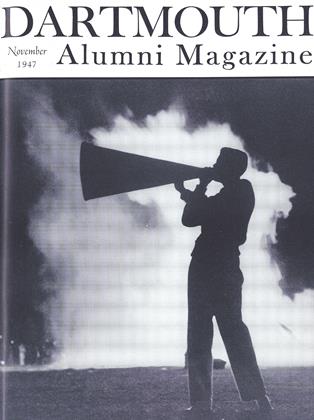J. B. Lippincott Co.; Phila. andNew York pp. 241. $2.50.
On the surface Professor Kelly's book is the story of the history of Poland from its tribal beginnings to its present impasse. The narrative device whereby a young lad dreams or lives as a different person during the heroic periods of Polish history is used so effectively that one is always conscious of the identity of the lad, Filip, in his Odessey through time. Filip as wanderer, common soldier, refugee or aristocrat is always the same Filip or the Pole incarnate, in search of freedom. The heroic events and the great personages depicted in the story are historical facts but like the lad, Filip, they are events in the great Saga of the fight for freedom.
Considering the scope of the narrative it is surprising how successfully this small book portrays the spiritual intensity of the Pole as an individual and the Poles as a nation. To a large extent it is due to the narrative device described in the preceding paragraph. Other devices are the deft treatment of characteristic customs such as the feasts of ancient Poland, the übiquitous role of the Pilgrim as the symbol of an occult power, the Golden Horn, a material symbol of hope and cheer, appropriate use of Polish proverbs, the appearance of a Polish traitor in times of tragedy and the pageantry of the king and the church in times of glory.
In the last chapter Filip awakes from his dream or state of dissociation. The writer ends the romance with the denouement that the intimate friends that Filip had made in the various episodes spanning a thousand years are marshaled before him as members of the Polish household in which he awakes from his sleep. After a moment of rejoicing Filip and his friends prepare to go on a new mission of freedom. Thus the author suggests the permanency of Poland's role in history, and the strange power in man, unlimited by time and space, to sense and to seek the ideal.
 View Full Issue
View Full Issue
More From This Issue
-
 Article
ArticleWHAT IS A GREAT ISSUE ?
November 1947 By ARCHIBALD MACLEISH, -
 Class Notes
Class Notes1918
November 1947 By ERNEST H. EARLEY, DONALD L. BARR -
 Article
ArticleThe, Undergraduate Chair
November 1947 By JOHN P. STEARNS '49. -
 Class Notes
Class Notes1929
November 1947 By F. WILLIAM ANDRES, EDWIN C. CHINLUND -
 Class Notes
Class Notes1921
November 1947 By DONALD G. MIX, ROBERT M. MACDONALD -
 Article
ArticleCENTER CAMPAIGN OPENS
November 1947
THEODORE KARWOSKI
Books
-
 Books
BooksAssaying the Market
November 1975 By DONALD F. SAWYER '21 -
 Books
BooksFIVE CUMMINGTON POEMS:
February 1940 By Edward Fritz '40 -
 Books
BooksTHE MOTIVES OF NICHOLAS HOLTZ
March 1936 By H. M. Dargan -
 Books
BooksPREGNANCY: THE BEST STATE OF THE UNION.
APRIL 1972 By JOHN W. SCHLEICHER '40, M.D. -
 Books
BooksFACULTY PUBLICATIONS
DECEMBER 1926 By Kenneth A. Robinson -
 Books
BooksA Barrier of Maple Leaves
February 1976 By WALTER H. MALLORY




